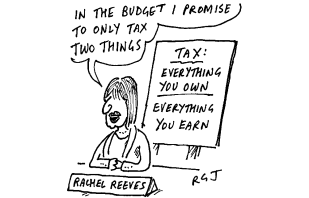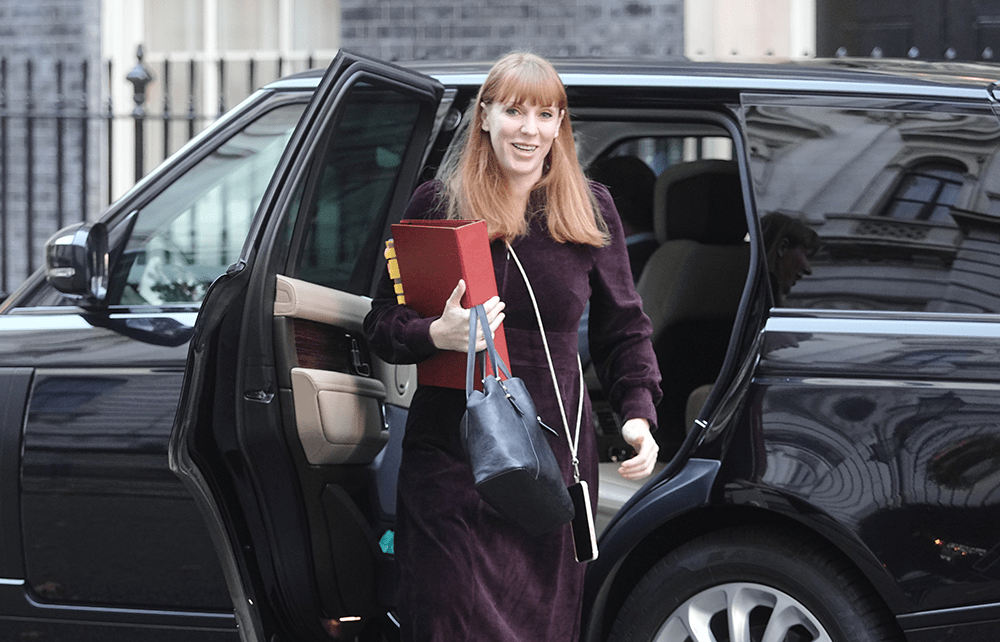On Monday evening, the Strangers’ Bar at Westminster was treated to a rare sight: Angela Rayner looking happy, smiling and holding court. As the newspapers went on the offensive over a new analysis of the Employment Rights Bill, which found it will cost business nearly £5 billion a year, the Deputy Prime Minister went to the Commons watering hole for a wine to celebrate the bill’s second reading.
It’s not just Rayner’s new deal for workers (now titled ‘make work pay’, following intense focus-grouping) that is giving her cause for fresh optimism. She is also enjoying a resurgence inside government after a tricky start. As Boris Johnson once said, ‘There are no disasters, only opportunities. And, indeed, opportunities for fresh disasters.’ While Keir Starmer navigates a route out of a difficult first 100 days and faces personal poll ratings of minus 30, there is a chance for his deputy to benefit.
Since Labour’s election victory, Rayner’s position has often been the subject of negative briefing. Pre-election talk of an office for the deputy proved premature: the gov.uk website states that ‘the current administration does not have a Deputy Prime Minister’s Office’. A Rayner ally points out that she actually has five: a departmental office for Housing and Local Government, one in the Cabinet Office complete with staff, her parliamentary office, her constituency office and one she occasionally uses in a Manchester government building.
Many of Rayner’s colleagues think she has the charisma the Prime Minister lacks
There is another point of view. ‘The office is dead because Pat [McFadden] is the real deputy prime minister,’ says one Labour figure. The power of McFadden – the veteran Blairite who leads the Cabinet Office – is felt across government. ‘He is the person Keir speaks to the most on a day-to-day basis,’ says a Downing Street aide. McFadden is seen to take on the unglamorous and serious work of government.
Meanwhile, Dorneywood, the grace-and-favour home that Blair once offered to John Prescott, has gone to the Chancellor. That’s not the only land grab by Rachel Reeves, which has created confusion among MPs about who exactly controls the planning brief. ‘I keep on asking, “Is Angela being kept in a cupboard?”’ says a party figure.
When Prescott was Blair’s deputy, he would busy himself of his own accord, knowing his political career had peaked. Rayner is a different beast. Her relationship with Starmer has had its ups and downs. One of Starmer’s first crises in opposition came when he tried to demote Rayner in a reshuffle – only for her to hold firm, delay the whole thing and come back stronger with three job titles.
Unlike Prescott, Rayner wants to be involved in making big decisions. Many of her colleagues think she has the charisma the Prime Minister lacks, as was apparent this week when she stood in for Starmer at PMQs. ‘When it comes to Starmer successors, Angela doesn’t come up the most in conversation, but it’s not impossible,’ says one MP.
Starmer and his new-look No. 10 are trying to build bridges with Rayner following the departure of Sue Gray. Gray was credited with initially smoothing relations between Rayner and Starmer (one cabinet minister says Gray adopted a ‘broken bird syndrome’, taking on under-appreciated ministers as personal projects). However, by the end of Gray’s brief time in government, the dysfunction in Downing Street was causing problems even for Rayner.
One of Morgan McSweeney’s first acts as Starmer’s new chief of staff was to make Rayner an official member of the national security council. She had been attending regularly anyway, but was missed off the list. ‘It meant it became a story,’ says one who was privy to the conversations. McSweeney’s decision comes as part of wider efforts to create ties across the party, such as moving the so-called ‘Spad school’ on Tuesdays from a dingy Westminster basement to 10 Downing Street. Last week Starmer addressed the Spads, this week it was Lucy Powell – leader of the house – discussing the government’s legislative agenda.
Ahead of next week’s Budget, Starmer needs friends across the party. ‘Keir knows he can’t afford to piss off the left right now,’ says an MP. ‘That means hugging Angela close.’ Following reports that Rayner had sent a letter to Starmer arguing against proposed cuts by Reeves, there is a heightened sense that the Prime Minister needs to work with the one member of his cabinet it would be hardest to sack – given that Rayner, like him, was elected by the party membership.
It has this week been agreed that Rayner will be allocated £1 billion in council house funding in the Budget. ‘In reality, it’s peanuts,’ says a senior Labour politician. Yet the funding boost can be presented as a win and it is popular with Labour voters. To cement her status as an important figure in the government, Rayner needs to go further and make her mark on policy. She hopes to do this with the planning brief (which is primarily with her department, despite briefings to the contrary) in the coming months.

Rayner retains strong ties to the trade unions and there are those on the party’s left who look to her as the government has to make trade-offs. She has a loyal band of new MPs who believe her support helped them secure their candidacy in safe seats. These include Paula Barker for Liverpool Wavertree (majority: 16,304), Anneliese Midgley in Knowsley (18,319), who crushed her rival Ryan Wain of the Tony Blair Institute, and Mark Ferguson in Gateshead (9,644).
The prospect of a left-wing revolt is weighing heavily on the right of the party. This week, a new parliamentary grouping called Labour First has emerged with the purpose of being ready to spring into action if the right needs to protect or influence the government. The Labour peer John Spellar and Luke Akehurst, a new MP and NEC old-timer, are among the figures leading the counter-revolution. ‘We know the left will try to make a comeback,’ says a figure involved. ‘They will accuse the government of betrayal whether it is the Budget or foreign policy. We need to be prepared.’
Ahead of what No. 10 aides expect to be a turbulent few weeks, Starmer will find it much easier to keep his party together if his deputy is in his corner.








Comments